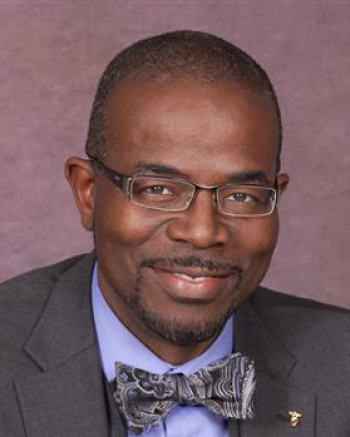Mississippi Today
Rejected State Supt. Robert Taylor says the situation ‘puts a stain on the state’

Rejected State Supt. Robert Taylor says the situation ‘puts a stain on the state’
Two weeks after being rejected by the Senate to serve as state superintendent, Robert Taylor defended his record of improving schools and said his nomination was manipulated into a political issue by Sen. Chris McDaniel as a part of his campaign for lieutenant governor.

Taylor lost out on the job to lead Mississippi’s public schools when the Senate rejected his nomination last month. Had he been confirmed, he would have been the second Black person to serve as state superintendent. Those who opposed his nomination took issue with his track record turning around schools, his status as an outsider, and the selection process itself. Immediately after the nomination failed, Senate Democrats said it was because of race.
“The person that we’re talking about, Dr. Taylor, is a native son,” Sen. David Jordan, D-Greenwood, said in a press conference after the vote. “He’s a Mississippian, who went to North Carolina and worked in their system, that system rated is higher than Mississippi, and he came home to serve. He’s a great and impressive son of Mississippi, and we rejected him for no reason other than the fact that God made him Black.”
Taylor was most recently a deputy state superintendent for the North Carolina Department of Public Instruction before moving back to Mississippi to begin his tenure as state superintendent in January. A native of Laurel, he earned his bachelor’s degree from the University of Southern Mississippi and his masters and doctorate in North Carolina.
Earlier in the confirmation process, questions were raised about Taylor writing for a Black student publication at USM, The Unheard Word, while he was in college. In an interview he gave in 2020 when the university celebrated the 30th anniversary of The Unheard Word, he said he wrote for the publication because it “… in my opinion, recognized that The University of Southern Mississippi was in the most racist state in the Union … ” In an interview with Mississippi Today, Taylor said he felt this way in college and his worldview has since been broadened by living in other places.
Sen. Chris Johnson, R-Hattiesburg, chaired the education nominations subcommittee and said Taylor’s writing for the publication was not something he remembered people talking about a lot.
“Really I don’t think that was a huge part of what happened, but you’d have to ask other senators who voted no,” Johnson said.
Taylor said his conversations with senators focused on education issues, but that when his involvement with The Unheard Word came up, he was straightforward with them and said it didn’t seem to be a concern for people.
“I like to think (race) didn’t play a role, but I do believe that politics had everything to do with it,” Taylor said.
McDaniel, the Republican senator from Ellisville, made comments on Facebook before and after the confirmation vote calling Taylor a supporter of critical race theory, affirmative action, and the removal of historical monuments, among other things.
“(Taylor) has all the makings of someone who has sold out to this woke culture,” McDaniel said on Facebook after the vote. “The step the Senate made today was to in some respects push back against the woke culture, to push back against liberalism in the institutions.”
Taylor rejected these claims and said he’s never spoken publicly on any of these issues.
“The only thing a person could say about Robert Taylor is that he is a registered Democrat in the state of North Carolina,” Taylor said. “That is it.”
Taylor said McDaniel wanted to use his nomination as a part of his campaign for lieutenant governor, to put pressure on senators with primary opponents who had previously told Taylor they would support him and later changed their votes.
“I represent the conservatives in the state of Mississippi,” McDaniel told Mississippi Today. “I wasn’t attempting to put pressure on anyone in a primary race. I was doing the same thing I’ve done for the past 16 years, and that’s to fight for my conservative values and principles the best way I know how.”
Taylor reiterated that while he would like to believe he was not rejected because he is Black, the accusations made against him make it look that way.
“Any senator that voted no, I would like to think it was not because I am Black, but they need to understand what the appearance looks like to people in the field,” he said. “When I am accosted about something I said thirty-five years ago, a view of why I did something thirty-five years ago, and all these things are said about me to make it appear as though I’m a particular type of person, people are going to look at that and believe that it’s race-based. If that’s the case or not, you’d have to ask those individual senators.”
Senators also expressed frustration with the hiring process, saying that the state Board of Education was not transparent, and that Taylor had not worked as an educator in Mississippi. Individuals familiar with the confirmation process said many local superintendents asked the state Board of Education to select a Mississippi educator and were frustrated by the pick.
A review of the hiring process by the Joint Legislative Committee on Performance Evaluation and Expenditure Review (PEER) found that of the 26 candidates who applied for the position, nine were employed in Mississippi and 17 were employed in another state. A source close to the hiring process said that of the four finalists, three were working in Mississippi.
Taylor, who prior to this appointment worked in North Carolina schools since 1992, said he did not get the impression that local superintendents wanted someone different when he met them.
“What I saw was superintendents looking forward to working with someone who had actually done the work that they had done,” he said. “You’re always going to have those that look for something different, and I absolutely respect that, but they were very gracious with me when I met with superintendents.”
Carey Wright, the previous state superintendent, had worked in district-level leadership positions but never served as a local superintendent before becoming the leader of Mississippi’s public education system.
Concerns were also raised about whether the district Taylor led for 10 years improved enough under his tenure. Some senators said they were dissatisfied with his record.
Taylor led the Bladen County School District from 2011 to 2021, but data is only available for some of those years on the North Carolina School Report Cards website. Between 2015 and 2019, the number of C-rated schools in the district rose from four to seven. D-rated schools fell from eight to three between 2015 and 2018, before jumping back up to six in 2019. The graduation rate for that period also rose from 77.3% to 91.6%, surpassing the state average during that period.
Taylor said the North Carolina accountability model, or the system that gives out letter grades, is significantly different from the system in Mississippi. North Carolina’s system is much more reliant on proficiency, or how many students hit a certain benchmark, he said, while Mississippi’s puts more weight in how much districts grow students from one year to the next.
“I’m very proud of the track record that I had, we were never a failing district,” Taylor said. “That accountability system is very different than what you see in Mississippi and a person would need to look at that in context.”
Taylor had publicly discussed his goal of providing direct support to low-performing districts and had visited all but one of them in his first two months on the job to learn about their needs. He said he had hoped to hire coaches for administrators and create regional support teams that would work with those districts in a variety of areas, a method he said had been successful in North Carolina.
“I’ve seen a state superintendent visit my district once in my 15 years in the classroom, and that was three weeks ago when Dr. Taylor came to Rosedale,” Shana Bolden, a teacher in the West Bolivar School District, said in a Teach Plus Mississippi press release. “I think the search should include public input before a decision is made. There should also be a way for teachers to have a voice in the process, since whoever is hired directly impacts us and our students.”
In terms of next steps, Taylor is currently looking for opportunities that would be a good fit for him, both in Mississippi and elsewhere.
“I certainly want to work in a place where someone welcomes my ability to work with an educational system and state for improvement,” he said. “There’s never a place I’ve been that didn’t improve. I’ve never worked in a place that was replete with resources that made the work easy. My work has always been uphill in challenging situations and I know that’s where I’m needed.”
He added his rejection will likely make this position harder for the state Board of Education to fill moving forward and that he does not expect any candidate will be willing to move here before being confirmed by the Legislature.
“(Senators) have to recognize the position they’ve put the (Mississippi Department of Education) in and the state of Mississippi because the rest of the nation has looked at what happened, and I’ve had people from all over the country reach out and share how horrible they thought this was,” he said. “It puts a stain on the state.”
This article first appeared on Mississippi Today and is republished here under a Creative Commons license.
Did you miss our previous article…
https://www.biloxinewsevents.com/states-lack-of-jail-inspections-a-disaster-in-the-making-lawyer-says/
Mississippi Today
On this day in 1997


Dec. 22, 1997

The Mississippi Supreme Court upheld the conviction of white supremacist Byron De La Beckwith for the 1963 murder of Medgar Evers.
In the court’s 4–2 decision, Justice Mike Mills praised efforts “to squeeze justice out of the harm caused by a furtive explosion which erupted from dark bushes on a June night in Jackson, Mississippi.”
He wrote that Beckwith’s constitutional right to a speedy trial had not been denied. His “complicity with the Sovereignty Commission’s involvement in the prior trials contributed to the delay.”
The decision did more than ensure that Beckwith would stay behind bars. The conviction helped clear the way for other prosecutions of unpunished killings from the Civil Rights Era.
This article first appeared on Mississippi Today and is republished here under a Creative Commons license.![]()
Mississippi Today
Medicaid expansion tracker approaches $1 billion loss for Mississippi

About the time people ring in the new year next week, the digital tracker on Mississippi Today’s homepage tabulating the amount of money the state is losing by not expanding Medicaid will hit $1 billion.
The state has lost $1 billion not since the start of the quickly departing 2024 but since the beginning of the state’s fiscal year on July 1.
Some who oppose Medicaid expansion say the digital tracker is flawed.
During an October news conference, when state Auditor Shad White unveiled details of his $2 million study seeking ways to cut state government spending, he said he did not look at Medicaid expansion as a method to save money or grow state revenue.
“I think that (Mississippi Today) calculator is wrong,” White said. “… I don’t think that takes into account how many people are going to be moved off the federal health care exchange where their health care is paid for fully by the federal government and moved onto Medicaid.”
White is not the only Mississippi politician who has expressed concern that if Medicaid expansion were enacted, thousands of people would lose their insurance on the exchange and be forced to enroll in Medicaid for health care coverage.
Mississippi Today’s projections used for the tracker are based on studies conducted by the Institutions of Higher Learning University Research Center. Granted, there are a lot of variables in the study that are inexact. It is impossible to say, for example, how many people will get sick and need health care, thus increasing the cost of Medicaid expansion. But is reasonable that the projections of the University Research Center are in the ballpark of being accurate and close to other studies conducted by health care experts.
White and others are correct that Mississippi Today’s calculator does not take into account money flowing into the state for people covered on the health care exchange. But that money does not go to the state; it goes to insurance companies that, granted, use that money to reimburse Mississippians for providing health care. But at least a portion of the money goes to out-of-state insurance companies as profits.
Both Medicaid expansion and the health care exchange are part of the Affordable Care Act. Under Medicaid expansion people earning up to $20,120 annually can sign up for Medicaid and the federal government will pay the bulk of the cost. Mississippi is one of 10 states that have not opted into Medicaid expansion.
People making more than $14,580 annually can garner private insurance through the health insurance exchanges, and people below certain income levels can receive help from the federal government in paying for that coverage.
During the COVID-19 pandemic, legislation championed and signed into law by President Joe Biden significantly increased the federal subsidies provided to people receiving insurance on the exchange. Those increased subsidies led to many Mississippians — desperate for health care — turning to the exchange for help.
White, state Insurance Commissioner Mike Chaney, Gov. Tate Reeves and others have expressed concern that those people would lose their private health insurance and be forced to sign up for Medicaid if lawmakers vote to expand Medicaid.
They are correct.
But they do not mention that the enhanced benefits authored by the Biden administration are scheduled to expire in December 2025 unless they are reenacted by Congress. The incoming Donald Trump administration has given no indication it will continue the enhanced subsidies.
As a matter of fact, the Trump administration, led by billionaire Elon Musk, is looking for ways to cut federal spending.
Some have speculated that Medicaid expansion also could be on Musk’s chopping block.
That is possible. But remember congressional action is required to continue the enhanced subsidies. On the flip side, congressional action would most likely be required to end or cut Medicaid expansion.
Would the multiple U.S. senators and House members in the red states that have expanded Medicaid vote to end a program that is providing health care to thousands of their constituents?
If Congress does not continue Biden’s enhanced subsidies, the rates for Mississippians on the exchange will increase on average about $500 per year, according to a study by KFF, a national health advocacy nonprofit. If that occurs, it is likely that many of the 280,000 Mississippians on the exchange will drop their coverage.
The result will be that Mississippi’s rate of uninsured — already one of the highest in the nation – will rise further, putting additional pressure on hospitals and other providers who will be treating patients who have no ability to pay.
In the meantime, the Mississippi Today counter that tracks the amount of money Mississippi is losing by not expanding Medicaid keeps ticking up.
This article first appeared on Mississippi Today and is republished here under a Creative Commons license.![]()
Mississippi Today
On this day in 1911


Dec. 21, 1911

Josh Gibson, the Negro League’s “Home Run King,” was born in Buena Vista, Georgia.
When the family’s farm suffered, they moved to Pittsburgh, and Gibson tried baseball at age 16. He eventually played for a semi-pro team in Pittsburgh and became known for his towering home runs.
He was watching the Homestead Grays play on July 25, 1930, when the catcher injured his hand. Team members called for Gibson, sitting in the stands, to join them. He was such a talented catcher that base runners were more reluctant to steal. He hit the baseball so hard and so far (580 feet once at Yankee Stadium) that he became the second-highest paid player in the Negro Leagues behind Satchel Paige, with both of them entering the National Baseball Hame of Fame.
The Hall estimated that Gibson hit nearly 800 homers in his 17-year career and had a lifetime batting average of .359. Gibson was portrayed in the 1996 TV movie, “Soul of the Game,” by Mykelti Williamson. Blair Underwood played Jackie Robinson, Delroy Lindo portrayed Satchel Paige, and Harvey Williams played “Cat” Mays, the father of the legendary Willie Mays.
Gibson has now been honored with a statue outside the Washington Nationals’ ballpark.
This article first appeared on Mississippi Today and is republished here under a Creative Commons license.![]()
-

 News from the South - Arkansas News Feed7 days ago
News from the South - Arkansas News Feed7 days agoFaith-inspired ministry opens health clinic in Little Rock
-

 News from the South - Florida News Feed6 days ago
News from the South - Florida News Feed6 days ago‘Dirty Dancing,’ ‘Beverly Hills Cop,’ ‘Up in Smoke’ among movies entering the National Film Registry
-

 Our Mississippi Home5 days ago
Our Mississippi Home5 days agoThe Meaning of the Redbird During the Holiday Season
-

 Mississippi Today4 days ago
Mississippi Today4 days agoMississippi PERS Board endorses plan decreasing pension benefits for new hires
-

 Local News1 day ago
Local News1 day agoHard Rock Hotel & Casino Biloxi Honors Veterans with Wreath-Laying Ceremony and Holiday Giving Initiative
-

 News from the South - North Carolina News Feed2 days ago
News from the South - North Carolina News Feed2 days agoSocial Security benefits boosted for millions in bill headed to Biden’s desk • NC Newsline
-

 News from the South - Missouri News Feed2 days ago
News from the South - Missouri News Feed2 days agoCould prime Albert Pujols fetch $1 billion in today's MLB free agency?
-

 Mississippi News Video3 days ago
Mississippi News Video3 days ago12/19- Friday will be breezy…but FREEZING by this weekend






























